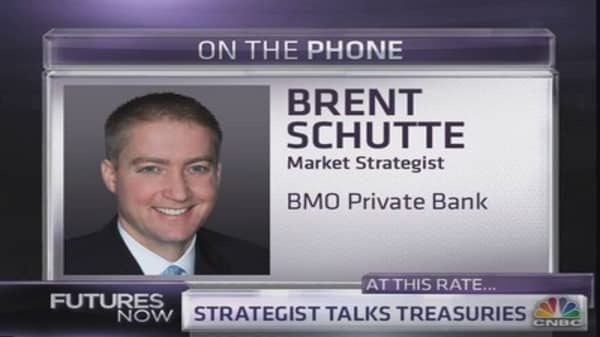Reason one: The economy is improving
While in recent years, low rates have been associated with a strong stock market, rates and stocks have historically tended to rise together. After all, as the economy improves, it is natural for people to demand a greater return on their investment.
And Schutte points out that the economic picture is significantly brighter than people acknowledge. "I think people are missing the idea that Europe and Japan and places like that"—in other words, areas that have caused economic anxiety—"are actually becoming less of a headwind. And so you've had this growth" in the U.S. economy.
That's why Schutte ties his rate thesis to gross domestic product, which is often considered the strongest indicator of economic strength. "If you get 5 to 6 percent nominal GDP growth, I think 6 to 7 percent on a 10-year Treasury is perfectly reasonable," he said.
(Read more: Here's why Marc Faber likes bonds more than gold)
Reason two: The Fed will taper in September
Schutte is a strong believer in a September tapering of quantitative easing. Not only is the economy improving, but "you've run out of the benefits of QE. It's done what it's supposed to do."
In addition, Schutte points out that in fiscal 2014, there will simply be fewer bonds for the Federal Reserve to buy.
"When the government's running 1 trillion-plus deficits, the Fed was probably thinking that they might want to buy up some debt to keep people from being crowded out by government debt," Schutte said. "Now, the Congressional Budget Office's budget deficit is expected to be $560 billion for fiscal year 2014. If the Fed keeps on buying at their current pace of $45 billion per month in the Treasury market, they will essentially buy the whole debt of the U.S. I don't think that's a place they want to be in."
And tapering could certainly be expected to raise rates. "The Fed has pretty much been the buyer of Treasurys, and a non-price-sensitive buyer," Schutte noted. Once the Fed moves out of the market, "it turns over to people who have the desire to earn a real rate of return."
(Read more: Pimco: Three reasons why bond investors have to chill)
Reason three: Inflation is coming
Inflation is a normal part of a growing economy. And as Schutte noted, "Just because there's not inflation now, that doesn't mean there won't be."
After all, much of the money that the Fed has injected into the market has been stuck on bank balance sheets. "There are $2 trillion worth of reserves that are threatening to come out on to the economy, and I think they will eventually lead to inflation," he said.
Inflation tends to increase bond yields, because a higher rate of inflation means that investors need to a greater rate of return just to receive the same effective sum on maturation.
And according to Schutte, Fed priorities almost make inflation a guarantee.
"I think the Fed has telegraphed that they have an asymmetric risk for deflation as opposed to inflation, and they're going to stick around too long, by definition, because of that," Schutte said.
All in all, Schutte thinks that we could see a 7 percent yield "in the next couple of years."















